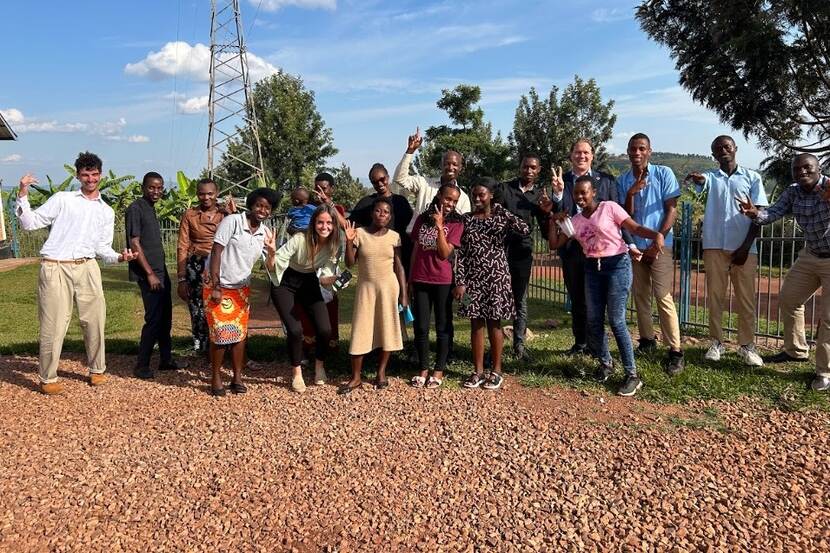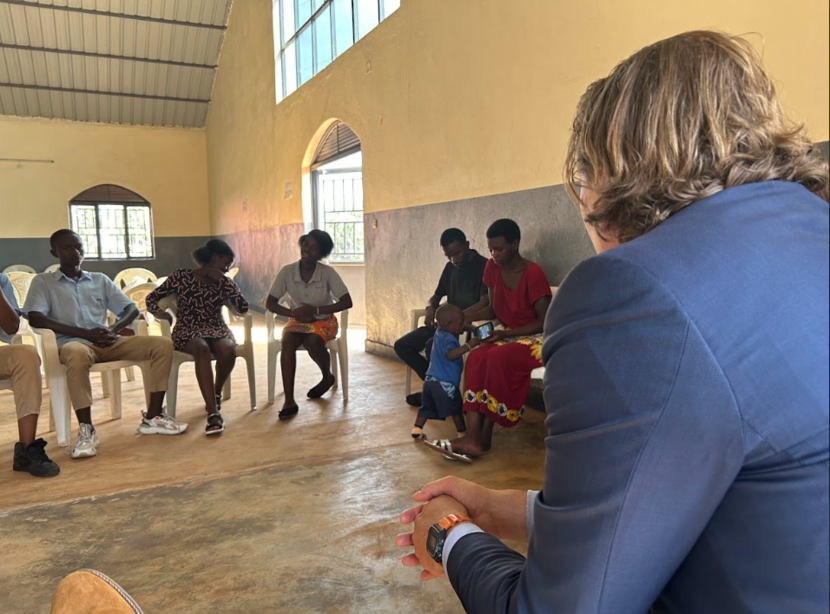Youth, Intergenerational Trauma and Peace Building: Stories from Rwanda
The United Nations Security Council unanimously adopted a historic resolution in 2015 which recognized the positive role of youth in international peace and security. As such, the role of youth in peacebuilding is increasingly recognized by organizations around the world. The Netherlands is also increasingly engaging with this agenda, which is evident through the work of our embassies and their engagement with organizations surrounding these topics.

One of these initiatives deals with peacebuilding through the lens of intergenerational trauma, located in Rwanda. Specifically, it regards the engagement of the Dutch Embassy with the NGO Community Based Sociotherapy Rwanda (CBS Rwanda). The ambassador for youth, education and work had an opportunity to visit their project, which aims at opening up space for talking about intergenerational trauma.
What is intergenerational trauma?
To understand the wider approach to peacebuilding employed by the CBS Rwanda, we first need to understand intergenerational trauma. This phenomenon starts with a traumatic event, which is then passed on through learned behaviors and collective experiences. A large part is transferred through the behaviours of the ones carrying the trauma.
However, trauma is also transferred because of epigenetic modifications that influence the child whilst in the womb. This can occur in two ways. One, because the baby was impacted by the actual trauma: it was still growing in the womb when the trauma occurred. A second possibility is that the interactions between mother and child through the placenta have been altered because of the trauma.
The children, grandchildren and generations that come after can experience far going consequences of the initial trauma, including emotional and psychological effects. Also, adopting patterns and reactions that are harmful for themselves and their environment is a common symptom.
Why is intergenerational trauma important for peace building?
When these symptoms occur in large groups of people, wider implications for the society emerge naturally. Therefore, in a peace building context, intergenerational trauma is often understood as the destruction of individual and collective structures over the span of several generations. It’s broader than a one-off experience; it continuously shakes up the foundation of a human being, a community, a society, and a culture – if not addressed properly.
Therapy for intergenerational trauma therefore has to occur on different levels, including the individual, political, social, and cultural. It’s important to highlight that using a bottom up approach to therapy through individuals and their communities is key, as they are the starting point of the healing and peacebuilding process.
In order to account for phenomena that are larger than individuals and communities (e.g. the political, social and cultural realm), therapy for intergenerational trauma is often approached through the lens of human rights, culture, and gender. This allows for a reflection on the impact of past occurrences while taking into account the bigger picture. As such, it helps to identify bottlenecks in relation to individual peace, which in turn feeds into wider peacebuilding structures.

Why is intergenerational trauma relevant in the context of Rwanda?
As should be clear right now, understanding trauma and its impact on future generations requires a tailored approach; every source of intergenerational trauma is unique. So, too, in Rwanda. But, why is intergenerational trauma an important topic in Rwanda to begin with?
This relates to the events of 1994. Rwandan society lived through an intense genocide in this year; a disaster that both destroyed and destabilized society. Over 80% of children experienced death in the family by 1994, and 90% believed they would die in the near future. Naturally, this became a source of trauma, which eventually resulted in widespread inter- and transgenerational trauma among youth; a group that’s currently the majority of the Rwandan population.
NGO community based sociotherapy and the Dutch embassy
As indicated earlier, the Embassy of the Netherlands in Rwanda supports CBS Rwanda, which conducts research and performs community based sociotherapy sessions for dealing with intergenerational trauma in youth and others.
A study conducted by CBS Rwanda on communication between children and parents revealed several key findings. Many children reported that their parents refused to share information about the family’s past, believing that children would not be able to comprehend the magnitude and heaviness of genocide-related experiences. Their interactions often focused on school performance, working hard for a better future, and adhering to culturally normative behavior.
When children attempted to discuss more personal family experiences, most parents either remained silent or provided general or fragmented information. This left children confused and led them to actively seek meaning from their parents' silence, or to find information elsewhere. It was also reported that parents sometimes disclosed information accidentally, or under the influence of alcohol. In normal situations, inquiring about the family's past often raised negative emotions in parents, ranging from sadness to anger. As a child from your parents, you normally try to avoid these situations.
Identity and intergenerational trauma
It was found that, if not treated adequately, intergenerational trauma severely affects the identity of youth in Rwanda. Effects on their identity shows on three levels: individual identity, relational identity, and collective identity.
When looking at individual identity, the study showed that some descendants of perpetrators live with shame and guilt due to their parents' crimes, feeling burdened by their parents' sins. Descendants of survivors reported living in fear, and both groups experienced isolation, which was linked to mistrust within families and communities.
A ‘shift of responsibilities and roles’ was observed, when focusing on relational identity. Children often took care of their parents and siblings in the aftermath of the genocide. This shift was due to the full or partial absence of parents, who were either deceased, imprisoned, or weakened by trauma or mental disorders.
Many respondents also expressed diverse attitudes such as optimism, a desire for peace, self-respect, and mutual respect. They dream of a peaceful country and are eager to work hard to achieve this, with some aspiring to become leaders, entrepreneurs, or farmers. Additionally, they wish to help their parents repair damaged properties, especially descendants of ex-prisoners.
The collective identity of ‘Ndumunyarwanda’ (Being Rwandan) is perceived as extremely valuable and provides them with societal status. However, this collective identity often conflicts with their self-perceptions and the perceptions they believe others have of them. Despite these challenges, most children noticed positive changes in their personal and parents’ emotional lives, as well as improved family relationships and social interactions at the community level, after their parents’ participation in sociotherapy.
These three forms of identity are central in the NGOs approach to treating intergenerational trauma. Generally, the community based sociotherapy approach used by the CBS Rwanda supports people in constructively dealing with the psychosocial consequences of the genocide.

Community based sociotherapy group with young persons
During the therapy sessions, groups of 10 to 15 people from the same community come together. The participants have diverse socio-historical background, which means that people from both genocide survivors and genocide perpetrators join on a regular basis to talk about their emotions and experiences. In order to talk about the trauma, trust, openness, and peer-support are considered essential.
One of the sessions with youth was attended by the Dutch Ambassador for Youth, Education and Work. Although the youth in attendance didn’t experience the genocide directly, they are faced with the collective and personal traumas of their family members and the society in which they grew up. Some participants shared personal stories to underline this.
The youth provided valuable feedback about their experiences with sociotherapy. Before, they weren’t able to talk about topics relating to the trauma or gain an understanding of other perspectives. Now, the sessions allowed them to regain trust in others and the people surrounding them – empowering them to talk about it and process it together. In turn, this created an increased sense of communality and social support, which resulted in a remarkable energy and ambition in the often dire circumstances they still experience.
The approach in Rwanda shows that youth can play a role in peacebuilding, not only because it creates change from bottom up, but also because it’s a numbers game: 78% of the Rwandan population is considered youth. By upscaling initiatives like community based sociotherapy, dealing with intergenerational trauma can contribute to social cohesion, unity and peace – as has become evident in Rwanda.